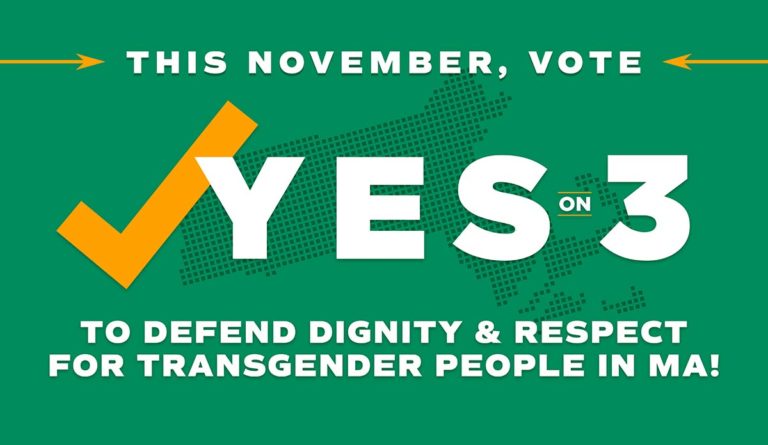Vote Yes on 3
Erin Polka urges a YES vote on Massachusetts Ballot Question 3, to uphold a state non-discrimination law and protect the the civil rights of transgender individuals.

Read Time: 4 minutes
Published:
In July of 2014, Governor Charlie Baker signed a bill into law protecting the civil rights of transgender individuals in Massachusetts. Supported by a broad coalition of business, community, and civic groups, this Transgender Anti-Discrimination law ensures equal rights of transgender individuals in public spaces, including parks, restaurants, and public transportation. It also guarantees access to public restrooms, enabling individuals to use restrooms in accordance with their gender-identify.
What’s this week’s Ballot Question 3?
Ballot Question 3 asks: “Do you approve of a law summarized below, which was approved by the House of Representatives and the Senate on July 7, 2016?”
After a summary of the law, voters are guided: “A YES VOTE would keep in place the current law, which prohibits discrimination on the basis of gender identity in places of public accommodation. A NO VOTE would repeal this provision of the public accommodation law.”
That is, a YES vote keeps the existing law in place, continuing to protect transgender rights across the state.
What the Current Law Protects
Taking intimate photographs of people without consent and sexual assault are crimes, and violators are prosecuted under existing criminal law. The Transgender Anti-discrimination Law protects transgender individuals from acts of discrimination and social exclusion. It does not change criminal law. The anti-discrimination law states that a person’s gender identity cannot be used for an “improper purpose” and a person must assert a “consistent and uniform” gender-related identity if questioned in court.
The Opposition
Opponents of the anti-discrimination law include Keep MA Safe, funded primarily by the Massachusetts Family Institute, gathered 50,000 resident signatures to place the Transgender Anti-Discrimination Law on the 2018 ballot with the goal of repealing it. The passage of the 2014 law had immediately sparked opposition among some, based on fear that the law would allow sexual predators, posing as transgender women, to enter women’s restrooms to engage in criminal behavior. Opponents of the law also suggested that civilians who report suspicious gender-based behavior (such as questioning a person’s intent for entering a bathroom) risked being arrested and fined up to $50,000.
Neither of these hypothetical concerns has come to pass.
In fact existing laws do not allow male sex offenders to enter a women’s restroom or locker room. It also does not penalize citizens from reporting criminal behavior. Chapter 151B Section 5 of Massachusetts General Laws: Individuals and organizations can only be arrested or fined if found to have participated in the “discrimination or restriction” of a person based on gender identify. Contrary to ‘No on 3’’s campaign ads, fines of $50,000 many only incur when multiple acts of discrimination occur over a seven-year period.
The Nondiscrimination Law Promotes Health and Wellbeing
A study by the Williams Institute on Sexual Orientation and Gender Identity Law and Public Policy at the UCLA School of Law found that laws protecting transgender rights have had no effect on the number of bathroom-related crimes in the state of Massachusetts. In fact, they found that safety and privacy violations decreased in areas with stricter implementation of the nondiscrimination law. The researchers also found bathroom-related violations to be extremely rare, providing evidence that many of the opposition’s arguments are based on hypothetical outcomes rather than quantifiable data.
A 2015 report by the National Center for Transgender Equality found that 40% of transgender respondents expressed experiencing psychological distress (depression, stress, and anxiety) in the past month. Suicide attempts by transgender persons is 9 times higher than the national average. Before anti-discrimination legislation passed in North Carolina in 2016, 60% of transgender respondents reported avoiding public restrooms in fear of confrontations, 32% limited what they ate or drank so they didn’t have to use a bathroom, and 8% suffered from bladder-related infections as a result of bathroom avoidance.
What’s in Store for the Future
A June 2018 poll found that 49% of respondents were in favor of keeping the law, as oppose to 37% who reported in favor of repealing it. The margins are slim. This is especially concerning given the recent memo from the Department of Health and Human Services seeking to change Title IX’s legal definition of sex, which currently bans gender discrimination in schools that receive federal funding. This HHS change would create binary definitions of gender (male or female) based on an individual’s biological sex, as assigned at birth. It would eradicate the ability of 1.4 million transgender Americans to self-identify their gender.
Massachusetts is a leading state for policies concerning freedoms and equality. We were the first in the nation to recognize marriage equality. What message will we be sending to the rest for the nation if we repeal this law?
Your vote matters. So on November 6th, get out and vote YES on question 3!
Opportunities to volunteer with the Yes on 3 campaign can be found here.
Feature image from Freedom for All Massachusetts Coalition



